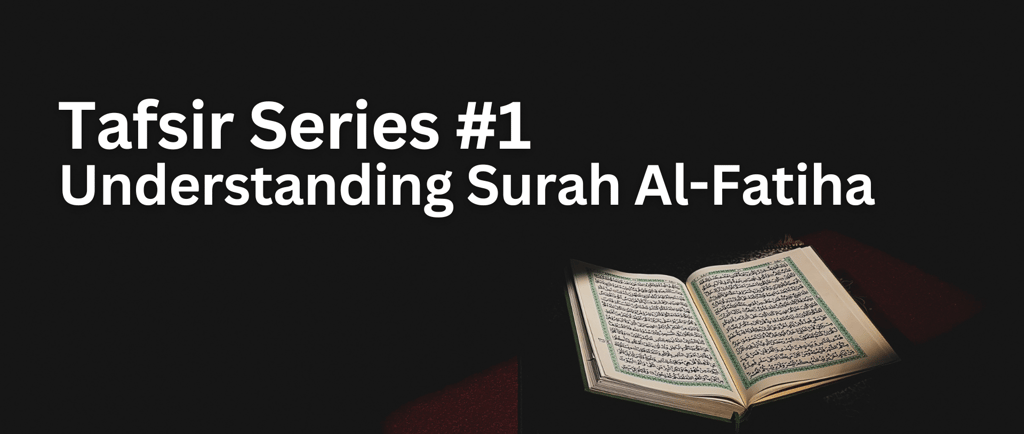
Tafsir Series:
#1 Understanding Surah Al-Fatiha
Deen Machine
Tafsir Series: #1 Understanding Surah Al-Fatiha
Welcome to Deen Machine's Tafsir Series, where we explore the meanings and lessons of the Quran to deepen our connection with Allah (swt) and His guidance. In this article, we explore the Tafsir of Surah Al-Fatiha, "The Opening," based on the classical work of Tafsir Ibn Kathir.
TAFSIRARTICLES


Introduction to Surah Al-Fatiha
Surah Al-Fatiha holds a unique and exalted position in Islam. It is often referred to as Umm Al-Kitab (The Mother of the Book) and is recited in every unit of prayer (Salah), signifying its centrality in the life of a Muslim. This surah encapsulates the essence of Islam, addressing Allah's Lordship, mercy, guidance, and the believer's submission.
Verse-by-Verse Tafsir of Surah Al-Fatiha
1. بِسْمِاللّٰهِالرَّحْمٰنِالرَّحِیْمِ
"With the Name of Allah, the Most Gracious, the Most Merciful."
Ibn Kathir explains that this opening phrase emphasises beginning every action with Allah's name, invoking His blessings and guidance. It reflects reliance on Allah and recognition of His attributes of mercy and compassion (Ar-Rahman and Ar-Raheem).
2. اَلۡحَمۡدُ لِلّٰهِ رَبِّ الۡعٰلَمِيۡنَۙ ٢
"All praise is due to Allah, the Lord of all the worlds."
This verse is a declaration of gratitude and recognition of Allah's (swt) greatness. Ibn Kathir highlights that Alhamdulillah signifies praise for Allah's (swt) perfection, sovereignty, and countless blessings. It should also be noted that, when saying all praise is due to Allah (swt), it means that it is Allah (swt) who is the only one deserving of praise, and when anything is praised, it is also praise to Allah (swt). The term Rabb indicates His role as the Creator, Sustainer, and Cherisher of everything in existence.
3. الرَّحۡمٰنِ الرَّحِيۡمِۙ ٣
"The Most Gracious, the Most Merciful."
Repeating Allah's (swt) attributes of mercy emphasises their significance. Ibn Kathir explains that Allah’s (swt) mercy is vast and encompasses all His creation, but it is particularly reserved for the believers in the Hereafter.
4. مٰلِكِ يَوۡمِ الدِّيۡنِؕ ٤
"Master of the Day of Judgment."
This verse reminds believers of the Day of Judgment, where Allah will be the ultimate judge of all deeds. Ibn Kathir notes that Maalik (Master) signifies Allah's complete authority and justice, instilling both hope and fear in the hearts of believers.
5. اِيَّاكَ نَعۡبُدُ وَاِيَّاكَ نَسۡتَعِيۡنُؕ ٥
"You alone we worship, and You alone we ask for help."
This verse represents the essence of Tawheed (monotheism). This is due to the emphaisis of "You Alone" coming at the beginning of the phrases. Ibn Kathir explains that it signifies the believer's commitment to worshipping Allah (swt) exclusively and seeking His help in all matters. It reflects reliance, humility, and devotion.
6. اِهۡدِنَا الصِّرَاطَ الۡمُسۡتَقِيۡمَۙ ٦
"Guide us to the Straight Path."
This is a heartfelt and sincere request for guidance to the path that leads to Allah’s (swt) pleasure. Ibn Kathir highlights that As-Sirat Al-Mustaqeem represents the way of the Prophets, the righteous, and those who adhere to the truth, avoiding deviation and falsehood.
7. صِرَاطَ الَّذِيۡنَ اَنۡعَمۡتَ عَلَيۡهِمۡ ۙ غَيۡرِ الۡمَغۡضُوۡبِ عَلَيۡهِمۡ وَلَا الضَّآلِّيۡنَ ٧
"The path of those You have blessed, not of those who have earned Your anger, nor of those who have gone astray."
Ibn Kathir explains that those blessed by Allah (swt) include the Prophets, truthful believers, martyrs, and the righteous. Al-Maghdub Alayhim (those who have earned Allah's (swt) anger) refers to those who knowingly reject the truth, while Ad-Dhaalleen (those who have gone astray) refers to those who are misguided due to ignorance.
Key Lessons from Surah Al-Fatiha
Gratitude and Praise: Begin every action by recognising Allah's mercy and sovereignty.
Tawheed: Worship and seek help exclusively from Allah.
Accountability: Remember the Day of Judgment and strive to live a life pleasing to Allah (swt).
Guidance: Continuously seek Allah’s guidance to remain steadfast on the Straight Path.
Avoiding Misguidance: Learn from the mistakes of those who incurred Allah's anger or were led astray.
Conclusion
Surah Al-Fatiha is more than a chapter of the Quran, it is a daily reminder of our purpose, our reliance on Allah (swt), and our journey towards His pleasure. By reflecting on its meanings and applying its lessons, we align our hearts and actions with the path Allah (swt) has prescribed for us.
Stay tuned for more articles and videos in the Tafsir Series, where we explore the Quranic guidance that shapes our lives. Let’s continue this journey of understanding and implementation together.
May Allah guide us all to the Straight Path. Ameen.
Socials:
https://www.youtube.com/@DeenMachine


